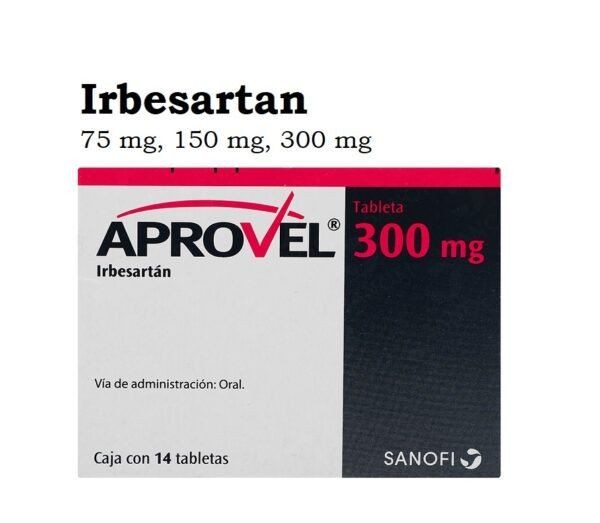
Contents
Side Effects of Avapro (irbesartan)
Angiotensin, formed in the blood by the action of angiotensin converting enzyme (ACE), is a powerful chemical that attaches to angiotensin receptors found in many tissues but primarily on smooth muscle cells of blood vessels.
Angiotensin’s attachment to the receptors causes the blood vessels to narrow (vasoconstrict), leading to increased blood pressure (hypertension). Avapro blocks the angiotensin receptor, dilates blood vessels, and reduces blood pressure.
Common side effects of Avapro:
- dizziness,
- increased blood potassium (hyperkalemia),
- diarrhea,
- abdominal pain or heartburn,
- fatigue,
- reduced blood pressure when rising from a sitting or standing position (orthostatic hypotension).
Serious side effects of Avapro:
- impotence,
- reduced kidney function,
- allergic reactions,
- inflammation and destruction of muscle (rhabdomyolysis),
- swelling of soft tissues including throat and larynx (angioedema).
Drug interactions of Avapro:
- potassium-sparing diuretics, potassium supplements, or salt substitutes containing potassium may lead to elevated blood potassium levels (hyperkalemia) and toxicity.
- Combining Avapro or other ARBs with nonsteroidal anti-inflammatory drugs (NSAIDs) in elderly, fluid-depleted patients or those with poor kidney function may result in reduced kidney function, including kidney failure. Aspirin and other NSAIDs may also reduce the effects of ARBs.
Avapro and similar drugs should not be used during pregnancy as they may cause injury and death to the fetus. Use of Avapro while breastfeeding is unknown; consult your doctor.
Important Side Effects of Avapro (irbesartan)
The most common side effects of irbesartan:
- dizziness,
- hyperkalemia,
- diarrhea,
- abdominal pain or heartburn,
- fatigue,
- reduced blood pressure when rising from a sitting or standing position (orthostatic hypotension).
Other important side effects:
- impotence,
- reduced renal function,
- allergic reactions.
Rare but serious side effects of irbesartan:
- Rhabdomyolysis (inflammation and destruction of muscle),
- angioedema (swelling of soft tissues including throat and larynx).
Avapro (irbesartan) Side Effects for Healthcare Professionals
The following important adverse reactions are described elsewhere in the labeling:
- Hypotension in Volume- or Salt-depleted Patients
- Impaired Renal Function
Clinical Trials Experience
Because clinical trials are conducted under widely varying conditions, adverse reaction rates observed in the trials of a drug cannot be directly compared to rates in the trials of another drug.
For hypertension, the following adverse reactions were reported in at least 1% of patients treated with Avapro and at a higher incidence versus placebo:
- diarrhea,
- dyspepsia/heartburn, and
- fatigue.
Irbesartan use was not associated with an increased incidence of dry cough. In placebo-controlled studies, the incidence of cough in irbesartan-treated patients was similar to placebo.
For nephropathy in type 2 diabetic patients:
- Hyperkalemia: Potassium levels were higher in the Avapro group versus placebo, leading to some discontinuations due to hyperkalemia.
- Orthostatic symptoms occurred more frequently in the Avapro group: dizziness, orthostatic dizziness, and orthostatic hypotension.
Post-Marketing Experience
Adverse reactions reported during post-approval use of Avapro:
Urticaria; angioedema involving swelling of the face, lips, pharynx, and/or tongue; increased liver function tests; jaundice; hepatitis; hyperkalemia; thrombocytopenia; increased CPK; tinnitus.
Drug Interactions with Avapro (irbesartan)
Agents Increasing Serum Potassium
Coadministration of Avapro with other drugs that raise serum potassium levels may result in hyperkalemia. Monitor serum potassium in such patients.
Lithium
Increased serum lithium concentrations and lithium toxicity have been reported with concomitant use of irbesartan and lithium. Monitor lithium levels in patients receiving irbesartan and lithium.
Non-Steroidal Anti-Inflammatory Drugs (NSAIDs) Including Selective Cyclooxygenase-2 Inhibitors (COX-2 Inhibitors)
Co-administration of NSAIDs, including selective COX-2 inhibitors, with angiotensin II receptor antagonists (including irbesartan) in elderly, volume-depleted patients or those with compromised renal function may result in deterioration of renal function, including possible acute renal failure. Monitor renal function periodically. The antihypertensive effect of angiotensin II receptor antagonists may be attenuated by NSAIDs including selective COX-2 inhibitors.
Dual Blockade Of The Renin-Angiotens In System (RAS)
Dual blockade of the RAS with angiotensin receptor blockers, ACE inhibitors, or aliskiren is associated with increased risks of hypotension, hyperkalemia, and changes in renal function compared to monotherapy. Most patients receiving the combination of two RAS inhibitors do not obtain any additional benefit compared to monotherapy. Monitor blood pressure, renal function, and electrolytes in patients on Avapro and other agents that affect the RAS. Do not co-administer aliskiren with Avapro in patients with diabetes. Avoid use of aliskiren with Avapro in patients with renal impairment (GFR < 60 mL/min).
Summary
Avapro (irbesartan) is an angiotensin receptor blocker (ARB) used to treat high blood pressure (hypertension) and diabetic nephropathy or kidney disease. Common side effects of Avapro include dizziness, increased blood potassium (hyperkalemia), diarrhea, abdominal pain or heartburn, fatigue, and reduced blood pressure when rising from a sitting or standing position (orthostatic hypotension). When used in the second or third trimester of pregnancy, Avapro and similar drugs may cause injury and even death to the fetus. It is unknown if Avapro is secreted into human milk.


